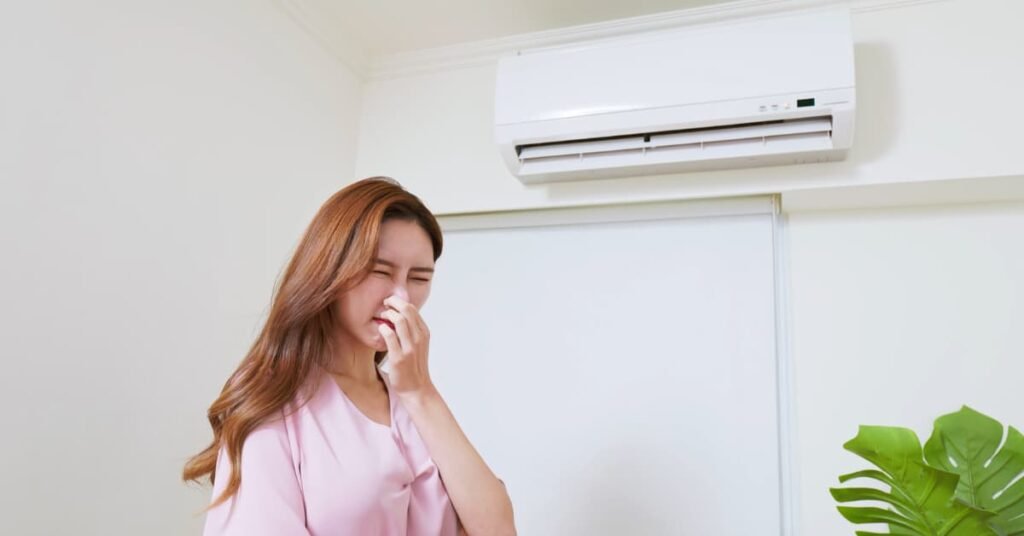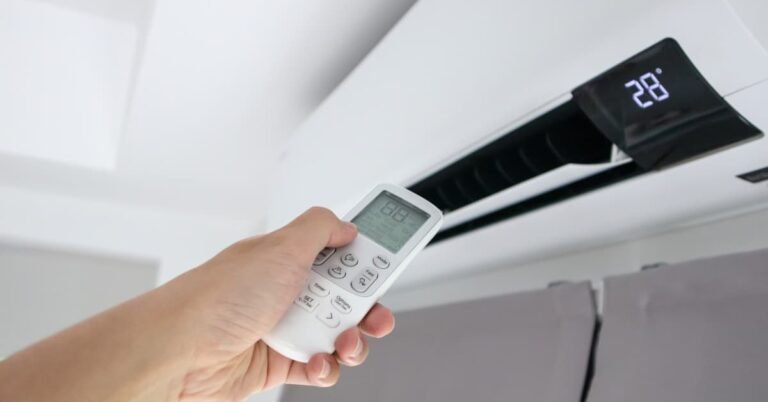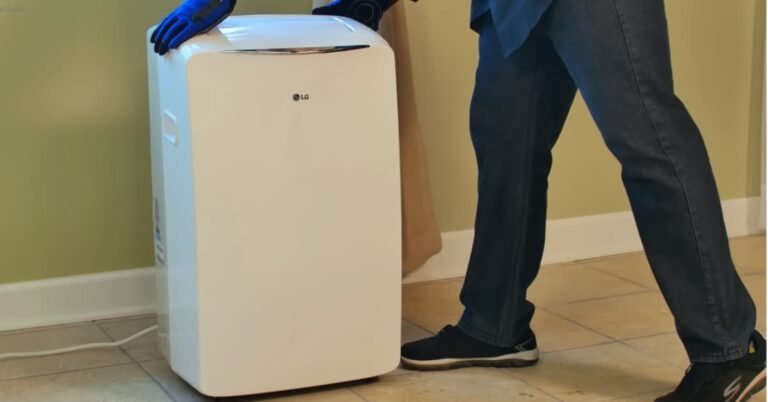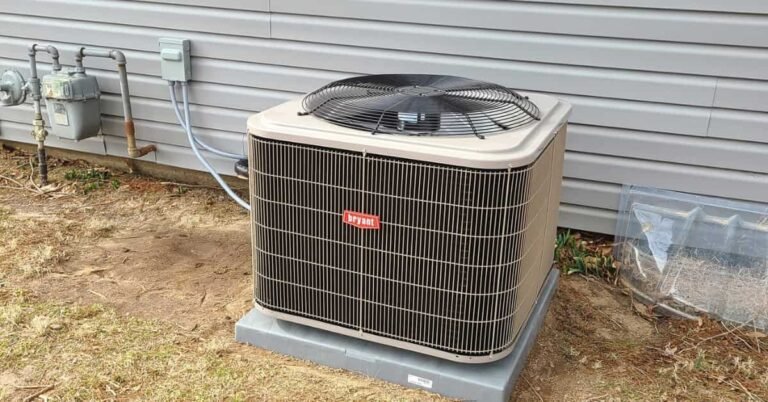Why Does My Air Conditioner Smell Like Chemicals?
When your air conditioner emits a chemical-like smell, it can be concerning. Understanding the reason behind this odor is crucial.
Several factors can contribute to such smells. These include electrical issues, improper installation, and the presence of dead animals.
Identifying the cause is crucial for finding a solution. To effectively address the problem, investigate electrical connections, ensure proper installation and maintenance, and address animal-related concerns.
Let’s see each possible cause and explore the steps to fix them.

Why Does My Air Conditioner Smell Like Chemicals?
Here are some common reasons why your air conditioner may smell like chemicals:
1. Chemical Cleaners or Solvents
If your air conditioner emits a chemical-like smell, it could be due to the use of cleaning agents or solvents in the system.
Chemicals can leave residue, causing unpleasant odors when the AC is running. Identifying the source is crucial for effective resolution.
Solution:
1. Ventilate the Area: Open windows and doors to ensure proper ventilation while addressing the issue.
2. Remove Chemical Residue: Turn off the air conditioner and inspect the evaporator coils and condensate drain pan for any chemical residue. Clean these components using a mixture of mild soap and warm water, ensuring thorough rinsing.
3. Switch to Gentle Cleaners: Avoid using harsh chemical cleaners or solvents. Opt for gentle cleaning agents specifically designed for air conditioning systems.
4. Proper Cleaning Technique: When cleaning, follow the manufacturer’s guidelines and instructions for cleaning the AC unit to prevent any damage.
5. Regular Maintenance: Establish a regular maintenance routine to clean and maintain important components of the air conditioner.
2. Mold or Mildew
Another common cause of a chemical-like smell in air conditioners is the presence of mold or mildew.
These organisms thrive in damp environments, such as within the AC unit, and release foul odors that resemble chemicals.
Solution:
1. Inspect for Mold or Mildew: Turn off the air conditioner and visually inspect the system for any signs of mold or mildew growth. Check the evaporator coils, air filters, and drain pans.
2. Clean the Unit: If mold or mildew is found, clean the affected areas thoroughly. Use a mixture of water and vinegar or a mild detergent to disinfect the surfaces. Scrub gently and rinse well.
3. Replace Air Filters: Dirty air filters can contribute to mold growth and unpleasant smells. Replace them regularly as recommended by the manufacturer.
4. Improve Ventilation: Enhance ventilation in the area to minimize moisture buildup. Ensure there is adequate airflow around the AC unit.
5. Dehumidify: Consider using a dehumidifier to reduce excess moisture in the indoor environment.
3. Dirty Air Filters
A common cause of chemical-like smells in air conditioners is dirty or clogged air filters.
As air passes through the filters, accumulated dirt, dust, and contaminants can produce an unpleasant odor.
Solution:
1. Turn Off the AC: Before addressing dirty air filters, turn off the air conditioner to avoid any potential damage.
2. Locate and Remove the Filters: Check your AC unit for the location of the filters. They are typically found behind a cover on the front, sides, or inside the air handler unit. Remove them carefully.
3. Inspect the Filters: Examine the filters for dirt, dust, and debris. If heavily soiled or damaged, it’s best to replace them with new, clean filters.
4. Clean the Filters: If the filters are washable, rinse them under lukewarm water until all dirt and debris are removed. Gently pat dry or allow them to air dry completely before reinstalling.
5. Reinstall the Filters: Once the filters are clean and dry, reinsert them into their respective slots. Ensure they are securely in place.
6. Regular Filter Maintenance: Establish a routine for filter maintenance. Clean or replace air filters regularly based on the manufacturer’s recommendations or depending on the level of dirt accumulation.
4. Refrigerant Leak
A refrigerant leak can sometimes cause an air conditioner to emit a chemical odor.
Refrigerants contain chemicals that have distinct smells, which can be detected when there is a leak in the AC system.
Solution:
1. Safety First: If you suspect a refrigerant leak, it is important to prioritize safety. Turn off the air conditioner and ensure good ventilation in the area.
2. Detect the Leak: Engage a professional HVAC technician to inspect and identify the location of the refrigerant leak. They have the necessary tools and expertise to detect and resolve such issues safely.
3. Repair the Leak: Once the leak is identified, the technician will proceed with repairing or replacing the damaged components. This typically involves fixing the leak and recharging the refrigerant levels.
4. Professional Assistance: Refrigerant leaks should always be handled by qualified HVAC professionals as they require specialized knowledge and equipment for handling refrigerants safely.
5. Electrical Issues
If you notice a chemical-like smell coming from your air conditioner, it could be due to electrical issues.
Electrical problems can cause components in the AC unit to overheat or malfunction, resulting in strange odors.
Solution:
1. Turn off the AC: As a safety precaution, switch off the air conditioner and disconnect it from the power source.
2. Inspect Electrical Connections: Carefully examine the electrical connections within the AC unit, including the wiring and circuit board, for any loose connections or signs of damage.
3. Tighten Loose Connections: If you find any loose connections, use a screwdriver or the appropriate tool to tighten them securely.
4. Check for Burnt Components: Look for burnt or damaged components, such as wires or fuses. If you notice any, they may need to be replaced. Consult a professional HVAC technician if necessary.
5. Seek Professional Help: If you are uncomfortable working with electricity or if the issue persists after inspecting and tightening connections, it is safer to contact a qualified electrician or HVAC technician to diagnose and resolve the electrical problem.
6. Improper Installation
Improper installation of an air conditioner can lead to various issues, including chemical-like smells.
Inadequate installation can cause leaks, insufficient airflow, or malfunctioning components, resulting in unpleasant odors.
Solution:
1. Check for Installation Errors: Examine the air conditioner unit to determine if there were any obvious installation errors. Look for issues such as loose fittings, improper drainage, or blocked vents.
2. Address Drainage Problems: Improper drainage can lead to stagnant water, mold growth, and foul odors. Ensure that the condensate drain pan and drainage system are installed correctly and free from blockages.
3. Ensure Proper Airflow: Check the air conditioner’s ductwork and vents to ensure they are correctly sized and installed. Proper airflow helps prevent moisture buildup and the growth of mold or mildew.
4. Fix Leaks: Inspect the refrigerant lines and connections for any leaks. If you identify a refrigerant leak, it is essential to contact a professional HVAC technician to address the issue, as handling refrigerants requires specialized knowledge and equipment.
5. Consult a Professional: For complex installation issues or if you are unsure about how to proceed, it is advisable to consult a licensed HVAC technician who can assess the installation and make any necessary adjustments.
7. Dead Animals
Sometimes, the presence of dead animals near or within the air conditioning system can cause a chemical-like smell to emanate from the unit.
Animals like rodents or birds may seek shelter in vents or air ducts, leading to unpleasant odors.
Solution:
1. Turn Off the AC: To prevent further air circulation and the spread of odors, turn off the air conditioner.
2. Investigate the Source: Carefully inspect the air conditioning system, including vents and ducts, to identify the source of the odor. Look for any signs of dead animals such as droppings, nests, or visible remains.
3. Use Protective Gear: If you discover a dead animal, it is crucial to use gloves, a face mask, and other appropriate protective gear while handling it to avoid any health risks.
4. Remove the Dead Animal: Using a sealed plastic bag or disposable gloves, carefully remove the dead animal from the system. Double-bag the animal to prevent any leakage or contamination.
5. Dispose of the Animal: Follow local regulations for the proper disposal of dead animals. Contact your local sanitation department or animal control authorities for guidance.
6. Clean and Sanitize: Thoroughly clean and sanitize the affected area, including vents, ducts, and surrounding surfaces, using a mixture of mild soap and water or a recommended cleaner. Ensure proper ventilation during the cleaning process.
7. Prevent Future Intrusions: To prevent future occurrences, seal any potential entry points for animals, such as holes or gaps in the vents or ductwork. Regularly inspect and maintain these areas to ensure they remain secure.
Frequently Asked Questions
Can The Chemical Smell From My Ac Be Harmful?
Yes, if left untreated, the chemical odor may lead to health hazards.
How Often Should I Change My Ac Filter?
Changing the AC filter every 1-3 months can help alleviate chemical smells.
How Can I Reduce The Chemical Smell From My Ac?
Regular cleaning, maintenance, and changing filters can help eliminate the odor.
Should I Use Air Fresheners To Mask The Chemical Odor?
Using air fresheners doesn’t address the root cause and can worsen the issue.
Is The Chemical Smell From The Ac A Sign Of A Bigger Problem?
Yes, it may indicate underlying issues that require immediate attention.
Conclusion
Several factors can cause a chemical-like smell from your air conditioner. Electrical issues can lead to overheating and strange odors. Improper installation can result in leaks or insufficient airflow, causing unpleasant smells. Additionally, the presence of dead animals within the system can create foul odors.
To fix these problems, check and tighten electrical connections, ensure proper installation, and address any drainage or airflow issues. In cases involving dead animals, safely remove the remains, clean the affected area, and take preventive measures.
Remember, if unsure or facing complex issues, consult a professional HVAC technician for assistance.






